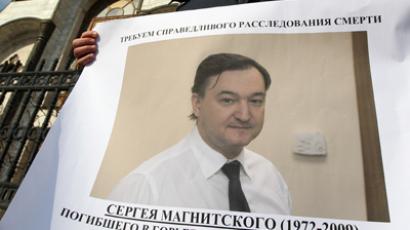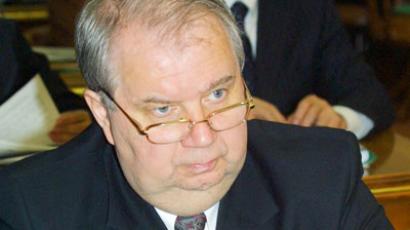US Ambassador to Russia: Wrong to link co-operation with human rights
The Obama administration wants to develop co-operation with the Russian authorities and people and does not want to hamper it by linking unrelated issues, US Ambassador to Russia Michael McFaul has said in an exclusive interview with RT.
RT: You have written recently about passing your six-month mark here in Russia and about some of the challenges that it inevitably brought with it. You were mentioning some of the legislative challenges that could have caused a strain to the US-Russia relations. So, I want to talk to you about the new Russian law that marked the foreign-sponsored NGOs as “foreign agents.” Now, the US Secretary of State has said that the US will find ways around those new laws. So, can you tell us what was meant by that “finding ways around”? Why would US-sponsored NGOs want to conceal that funding?Michael McFaul: In terms of transparency, the Obama administration supports the general idea of transparency. And we domestically have put a lot of effort into that. As a government – here it is called “open government” – we have a very similar set of policies and programs that the president has pushed forward. And internationally we have been very involved too. We have something called the “open-government initiative” that we signed up with other countries to have pledges to do that.So, the principle of transparency, we think, is a good one. People should know the sources of funding; no one has any trouble with that. What we are finding more troubling is the notion that if one takes money from a foundation that is abroad, that group gets labeled as “an agent” of that country. That is just not empirically true. That is not true. I, I can tell you, used to run an NGO when I was a professor at Stanford University. We took money from all kinds of different sources, including foreign sources. But nobody would ever confuse the center that I ran in Stanford as being an “agent” of those governments. I took money, actually, to go to school from a foreign country – the UK. There is something called the Rhodes Fund – and I was a Rhodes Scholar. And thanks to that foundation, I was allowed to get my PhD. Does that make me an agent of the UK government?So, we think, the principle of transparency is a good one. The assumption that to take money from the Hitachi foundation in Japan or a British foundation makes you an agent of that government – that is where we have a disagreement with the legislation.RT: So, what were exactly the “ways around” the US Secretary of State was talking about?MM: Well, I think we will try to make this more international; I will try to internationalize things, to try to downplay the bilateral part of it. And we want to work with the Russian government and with Russian NGOs because we believe the support is important. It is important. In my country we have hundreds of foundations, hundreds of foreign organizations, I am sure, tens of dozens of governments that actively work in the NGO world and political world. We think that is good for our society as an open society and we want to see the similar kind of relations with Russia.RT: Staying on the legislative part of it, the Magnitsky bill sanctions a number of Russian officials. And many say it’s been done to replace the cancelled Jackson-Vanik act. How much harm do you feel that has done to the reset between the US and Russia?MM: We in the Obama administration have been very clear: we want to engage with Russia, government and society, on security issues, economic issues, democracy and human rights issues. And we do that every day. I do that every day in doing my job in Russia. What we don’t want to do is to link issues which we think are unrelated. So we have been trying very diligently to avoid linkage between, say, issues with respect to European security and trade, or issues with respect to human rights and security. We deliberately are not pursuing a policy of linkage.So, with respect to Jackson-Vanik and PNTR (Permanent Normalized Trade Relations), we have worked very hard with the Russian government to assist them, and I am just quoting back Mr. Putin himself, he said this to my president in Los Cabos [Mexico] a few weeks ago. We helped with that process of Russia’s accession into the World Trade Organization and now we need to finish our part of that by lifting Jackson-Vanik. We want to do that in one thing. We also want to address human rights violations in Russia and, by the way, in all countries around the world. We have looked very closely into the tragic death, the wrongful death, of Mr. Magnitsky, the lawyer, and we have taken action with respect to that already. And therefore, we don’t see why these two things should be linked. We don’t think one needs to replace the other.But we have a democracy, we have an open system, other senators, other members of Congress, other NGOs have spoken loudly on this. It is a debate going on in Washington. I don’t know how it will end; I know what our position is. We are going to work very hard to make sure whatever disagreement we have about this legislation, however it ends – and I really don’t know how it will end because I’m not an expert on the US Congress. I want to make sure your viewers understand, but we are going to work hard to say, “Let’s deal with this in this room and let’s continue to co-operate in literally hundreds of other areas that we co-operate with Russia in today.” That’s what we are going to try to do.RT: Now, obviously, you said in your writing as well, summarizing the last six months that you have spent here as the US Ambassador, that one of the biggest challenges has been the ongoing situation in Syria. The spokesman to the US State Department had come out and said after the senior officials were killed in the attack that it was not surprising. But do you think that it has played the big part of the problem in the relationship between the US and Russia when it comes to Syria? The US hasn’t been seen to come out and condemn these acts of terrorism that have been carried out within the country and was, at the same time, showing very strong support for the opposition, which is not exactly clear what this opposition is?MM: We, from the very beginning, have always been against any violent means to try to resolve the political impasses in Syria. And that has been very clear from the beginning. That is why we are so enemy – because the regime, after all, killed tens of thousands of people. I don’t know how one calls it, you said the word terrorism, but let’s be clear that tens of thousands of innocent people have died in Syria. We think we need to do everything we can, working with the international community to end the violence – all the violence, by the way. And we have worked very hard to do that. We think that number one.Number two is to unite the international community to pressure all the actors in Syria to find a political transition to a new political equilibrium, a new political set of institutions that adheres to the aspirations of the Syrian people. That’s what we have been trying to do. We have been frustrated, very disappointed, in the vote in the Security Council last week. We think that would have been a useful step in the right direction to put more pressure on the Assad regime, but we are not going to stop. There is too much violence going on. It is atrocious what is happening in Syria today. We’ll continue to work to try to end the violence and to work with our partners around the world to try to pressure both the regime and the opposition to move to a new political outcome there. And we believe, as I know you know – I watch your show – I know we have said this a hundred times: we believe strongly that at some point in that transition it has to be a transition that does not include President Assad.RT: One final question. You made a mention of the discussion between President Obama and the Russian president. Obviously again you said in your writing that it is a critical period in US-Russia relations. How has the co-operation been between the US president and the new Russian president?MM: We were very pleased with that meeting. I will be honest with you: we had met with Prime Minister Putin before. I used to work at the White House, and so I accompanied President Obama when he came here in July 2009. We had a very interesting, long, philosophical I would even say, meeting with the prime minister – I think almost three hours long. It was a very interesting meeting. But because of the structure of diplomacy we meet with presidents, because we have a presidential system, so over the last three years we have seen a lot more of President Medvedev than Prime Minister Putin. And given the transition, as in all courtiers they go through elections and transitions, we had some anxieties – not me personally, but others in our government, in our society. “Is the reset over?” articles got written many-many times in my country. We came out of Los Cabos – and I was there, the president asked me to go, and believe me it is really hard to fly from Moscow to Los Cabos, you’ve got to work on this connection, but I was very honored to be there – and we came out of that meeting with the firm belief that Russia is committed to the reset. President Putin’s commitment to this general course in bilateral relations is secure.And on most issues – North Korea, Iran, controlling nuclear weapons around the world, fighting terrorism, increasing trade and investment between our two countries (by the way that was a major-major theme in their discussion), and how pleased Mr. Putin was with the American investment with Rosneft (and what could be between Exxon Mobile and Rosneft could be the largest investments, if not the largest investments in the history of the world) – we have spent a lot of time talking about how we need to increase that part of our co-operation, and we disagreed on some difficult important issues. But the general notion was what we started three and a half years ago, we think, has served security and economic interests, and we came out of that meeting believing that President Putin feels the same way.So, now it is a time to get down to work, to develop that personal relationship, and also to develop US-Russia relations, disagreeing when we do, but not letting disagreements on one issue say, “Well, then we can’t work on the other issue.” We don’t believe in that kind of linkage. And we feel pretty confident that we are going to be able to move forward with what President Obama and President Medvedev originally did to set relations between Russia and the United States.














